EKKSTACY wears JEANS by DSQUARED2, BRACELET by MARTINE ALI, BOOTS and BELT are TALENT’S OWN.
Stay informed on our latest news!
Stay informed on our latest news!
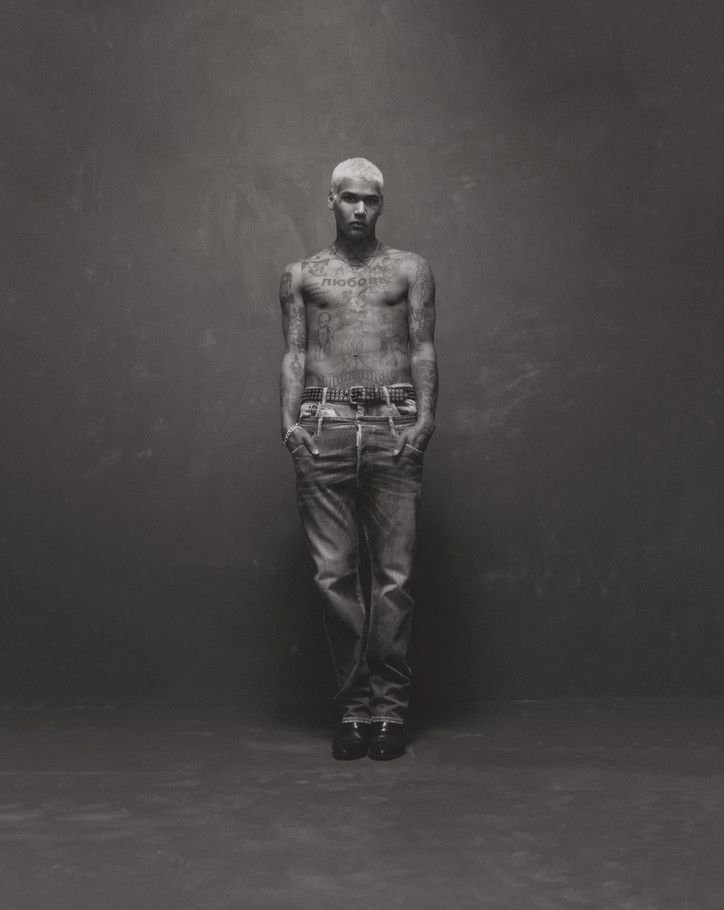
EKKSTACY wears JEANS by DSQUARED2, BRACELET by MARTINE ALI, BOOTS and BELT are TALENT’S OWN.
Jason Nocito— So what should we start with? Do we want to be really basic?
Ekkstacy— Have you ever interviewed somebody or is this your first time?
JN— This is probably the first interview I’ve ever done. Okay well, when I first hit you up on Instagram two years ago with the disbelief that you were from Vancouver, what was your response?
E— There was no response. I didn’t want to respond because you were a fucking photographer.
JN— Because I was some creepy old photographer sliding into your DMs?
E— Yeah, I told you I used to have a strong dislike for photographers.
JN— Why did you hate photographers so much?
E— First of all, I just don’t like being on camera. I do now, kind of. And, photographers are annoying.
JN— I agree. Photographers are the type of people who constantly need something from somebody else all the time.
E— Yeah like, “Can I have a photo pass? Can I have this? This? All I need is this...” but Andrew said I should meet you and then we met and I was like, “Damn, we’re boys.” Then we went on tour and we became best friends.
JN— I wouldn’t say we’re the same person, but we do have more alignment than less alignment. Any chance I get to hang out and talk with you, I’m happy.
E— It’s funny because we only spent two weeks in a car together. Two weeks is not long.
JN— We’re pretty good for people who don’t know each other.
E— I was also in a dark hole most of that tour... everything was tight and then it got bad. I was too drunk. I’m sober now. Kind of.
JN— Dry?
E— Yeah, I’m not binge drinking. I couldn’t even tell you why I was doing that.
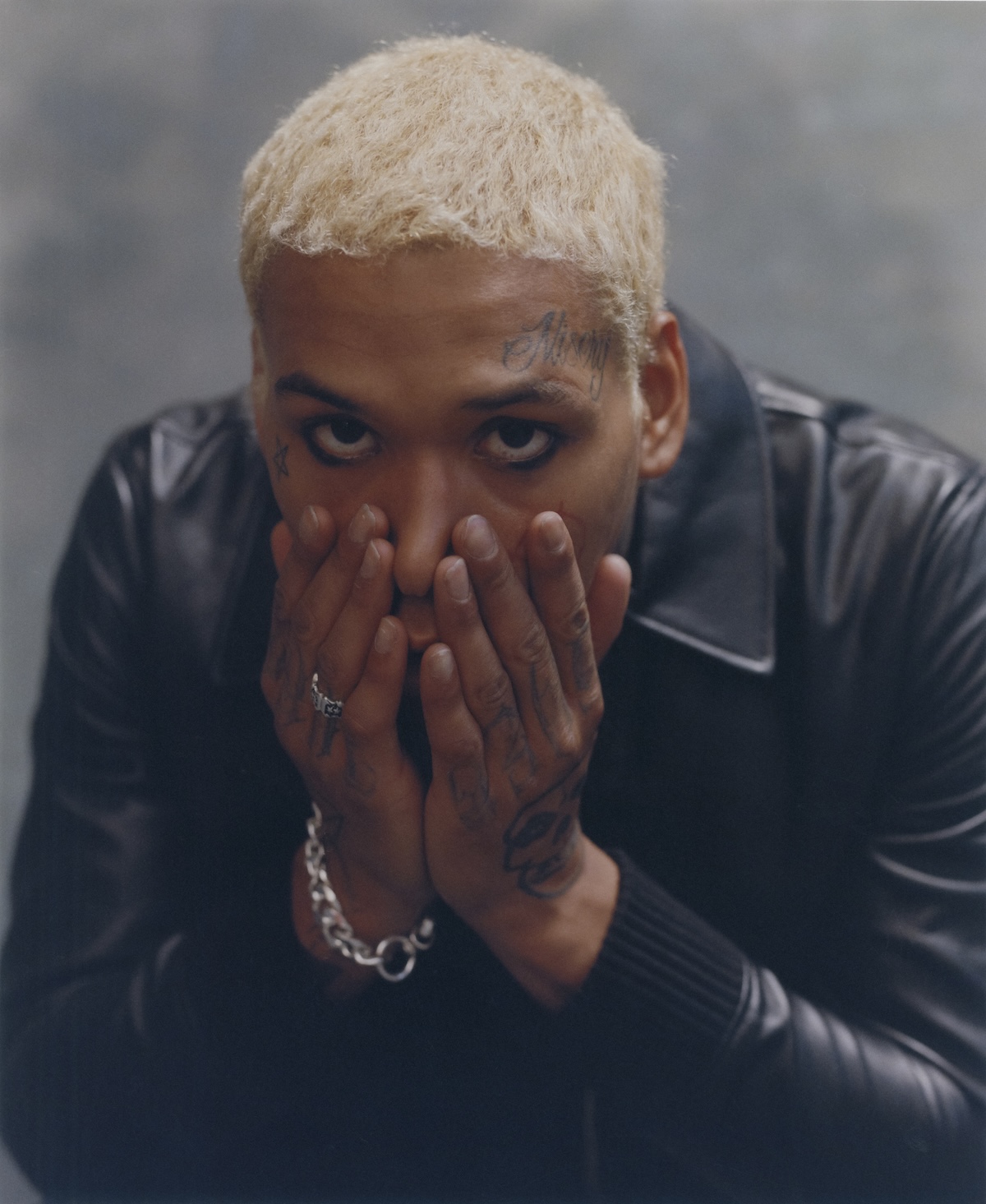
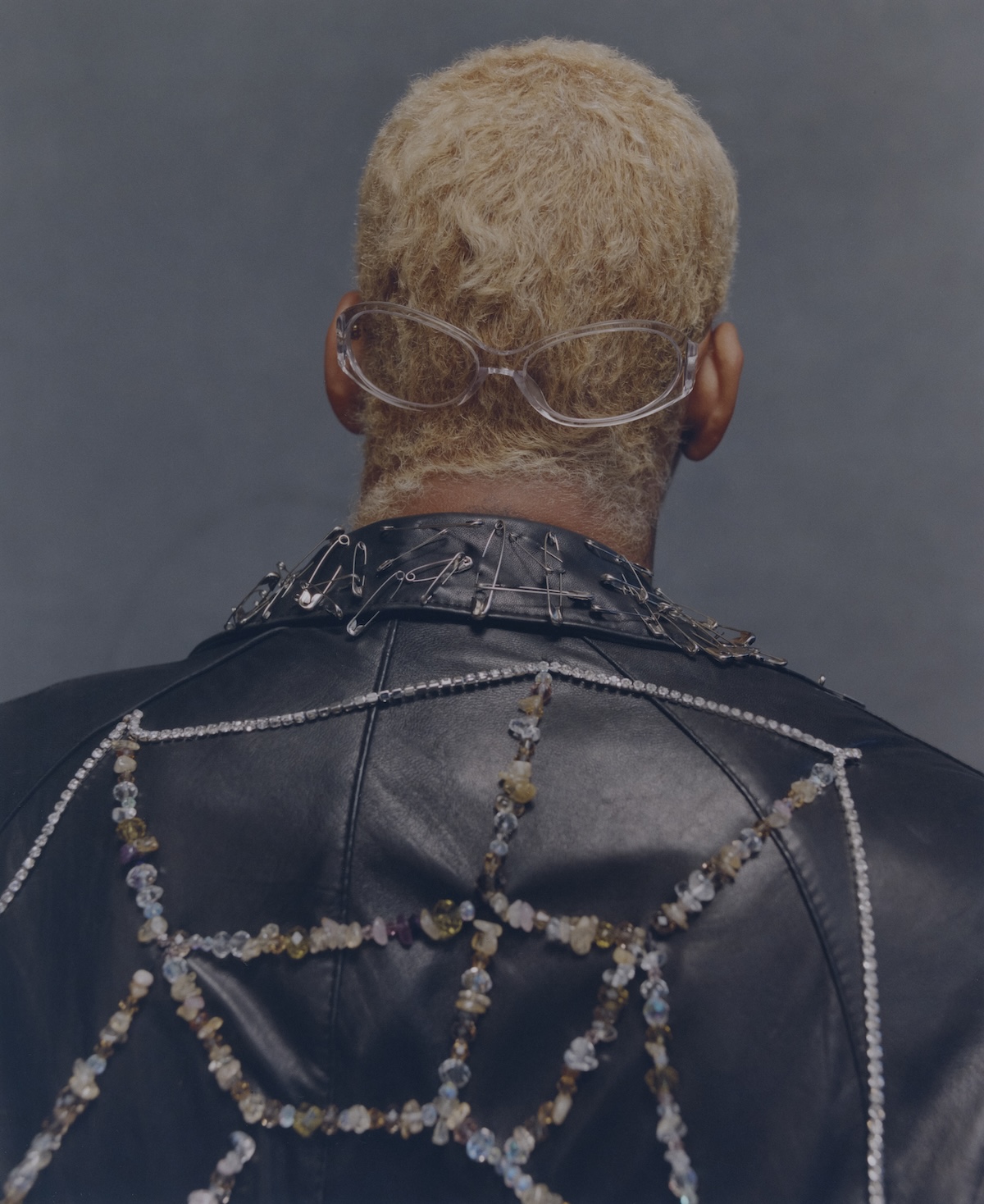
EKKSTACY wears JACKET and PANTS by OFFICINE GÉNÉRALE, TOP by Y-3, BRACELET by MARTINE ALI (left)
EKKSTACY wears COAT by DAUPHINETTE, GLASSES by FLATLIST x OFFICE (right)
JN— It’s hard to stop once you start.
E— Yeah, but I felt so awful.
JN— Maybe you were just nervous in New York.
E— New York wasn’t even the first day of that. I did it, every show, up until that day.
JN— Okay but let’s reel it back, how did you end up in music anyway?
E— My dad made music.
JN— What kind of music?
E— Bad rap music.
JN— So your dad’s the first white Canadian rapper?
E— Yeah, my dad has unreleased records.
JN— Did he produce them?
E— No, that fool had me producing music for him when I was 13, 14 on GarageBand.
JN— No way.
E— I’m so serious. I started on my grandma’s computer then leveled up to iPad GarageBand and upped to GarageBand on my own computer where I was making full-on rap beats.
JN— When did you start making your own music whatsoever?
E— The first time I sat in front of my computer with a microphone was December 26th, 2018.
JN— That’s insane.
E— My first song came out sometime in January 2019.
JN— The first song that you put up on SoundCloud?
E— Yeah, it might’ve even been December 30th, or is there a 31st in December?
JN— Yes.
E— Then, it might’ve been the 31st.
JN— But you had been spending time on SoundCloud before then right?
E— I was producing lo-fi beats and uploading those. I remember one got 800 plays and I thought that was super goated, but the SoundCloud algorithm is so shit now. We used to just blow up on there without anything else. You know what I mean?
JN— So at what point did you cross the line?
E— I crossed the line with “i walk this earth” March 2021, so really I was only in the mud for two years.
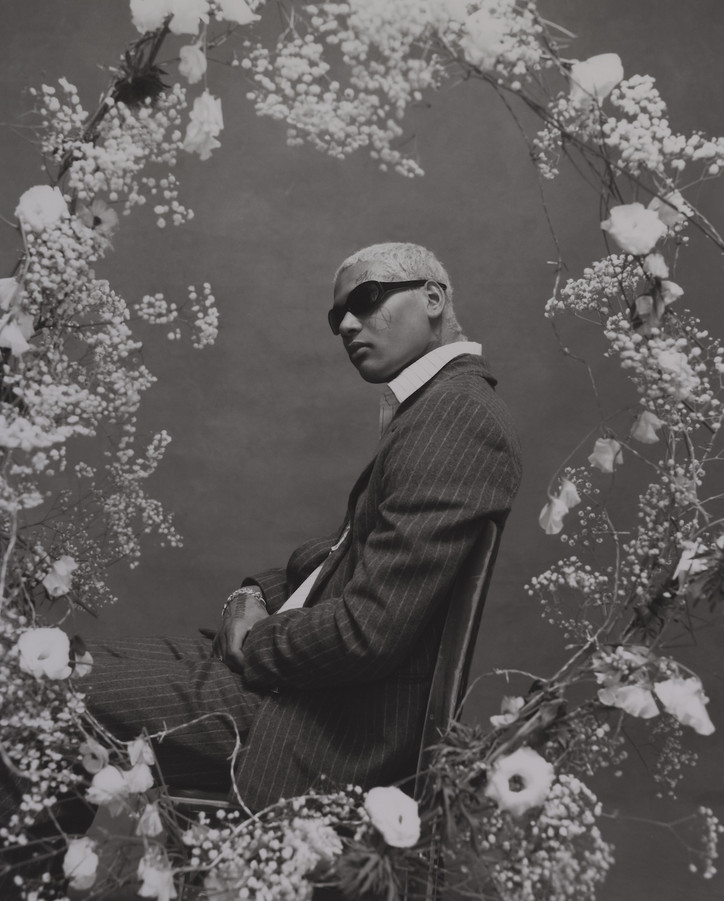
JN— How many songs versus beats had you put up on SoundCloud by then?
E— I only ever put out probably five beats, and then I probably put out maybe 45 songs on SoundCloud before “i walk this earth”. Maybe more like 50 to 75.
JN— Did you make them with other people or were you just cranking them out in your bedroom alone?
E— Always alone, or I’d have my homies in there, but always on YouTube beats, bro.
JN— Really? You weren’t making beats?
E— No, I wasn’t good enough. I could only make lo-fi shit. I couldn’t make good trap beats.
JN— That’s when you were working at Amazon and living in Vancouver.
E— In Langley and downtown at that point, in garages and shit. I would leave home for months and just couch-surf downtown.
JN— So you were just bouncing around for three years.
E— After my parents divorced, I would go back and forth between their cribs. Then I started blowing off school and eventually dropped out.
JN— In 12th grade?
E— Yeah.
JN— When did you get the face tat?
E— Right after I dropped out. I never went to school with a tattoo which I regret.
JN— What did your mom say when you came home with that?
E— I didn’t fucking go home. I FaceTimed her and I can’t remember exactly what she said, but she cried.
JN— What about your dad?
E— I don’t think he saw it either. I was staying with him at the time and he just told me not to come home.
JN— Do your parents see you now? Are they proud?
E— Yeah, dude, for sure. We’ve done a lot of fun shit since everything’s happened.
JN— And that brings you...
E— That brings us to today, where I live in New York City now. I was in LA for six months and in and out of LA for the last year and a half.
JN— So New York City is your favorite city?
E— Second. Vancouver is my favorite city.
JN— Right. And that’s what we have most in common. Except for the reverse. New York’s my favorite and Vancouver is what New York is to you.
E— Yeah.
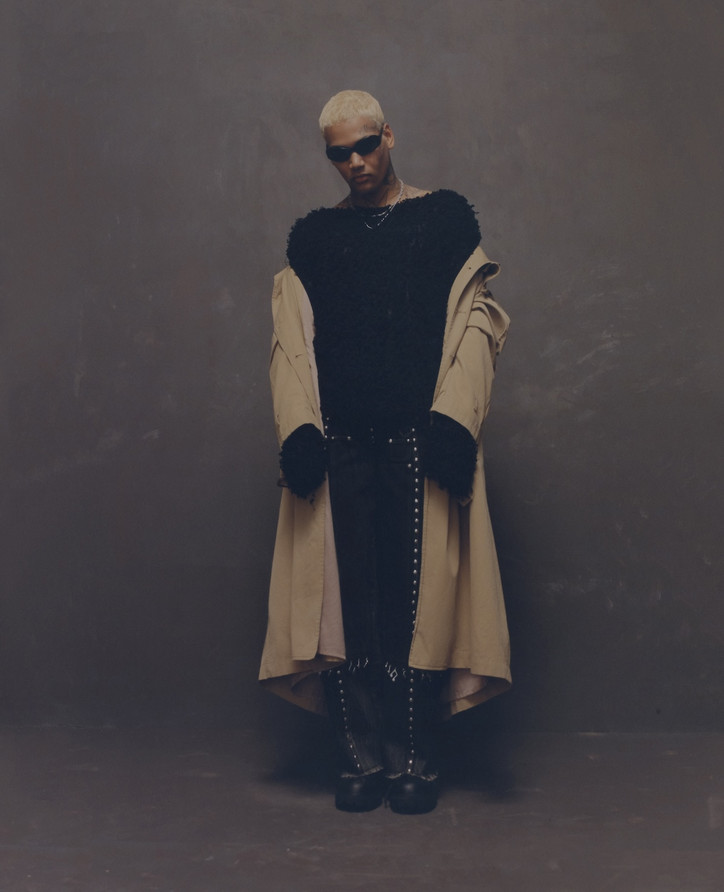
JN— So when you make something, when you made “i walk this earth”, did you know it was going to blow up?
E— No clue. No idea. It felt good, just like every other song feels good.
JN— At that point, what were you listening to?
E— Only Current Joys and The Drums.
JN— How did you go from the triple X world to—
E— I stopped listening to the SoundCloud shit a while ago.
JN— But what was the first thing you got into outside of that?
E— In high school, I wasn’t just listening to SoundCloud. I was also listening to really basic indie stuff. That’s what got me into Mac DeMarco, The Drums, Mild High Club, and shit like that. Me and the homies, we always liked indie and punk and all that shit, but we just didn’t know how to play instruments. It wasn’t band culture in high school. We thought it was tight and we liked it, but impossible for us to do.
JN— It seemed for a long time that it was just SoundCloud rap.
E— When I grew up, it was a punk scene, and you would get fanzines and write letters to people, staying in touch and creating a community that way. SoundCloud’s community and the internet obviously operate in a totally different way. SoundCloud’s dead now.
JN— So this next record then? How do you even start?
E— It’s so easy. You just do it. I don’t take much credit for anything I do. I feel like it just happens, even from the beginning—from the second I sat at my computer in 2019. It just comes to you and you get lucky. Sometimes, you make a big song, you blow it, and sometimes you make a shitty one. Usually, whatever comes to mind first is going to be the best thing you make.
JN— Is anxiety a motivator for you? Do you ever feel paralyzed?
E— No. I don’t think anxiety is present in the creative process at all. I mean, I’ll get a little nervous whenever I’m making a song and it’s going too well, like if we’re speeding through something, the riff is amazing, the drums are amazing, the bass, everything. But that’s how I’ve done every single song I ever made. Instrumental first, vocals after.
JN— And you aren’t going to do that anymore?
E— I have a band now. We’re going to demo now, just write as we go.
JN— You’re not going to be doing it with your friend, the German guy anymore?
E— I’m sure that Mango will be in the room and play with us, but it’s going to be us making the record.
JN— When do you plan on releasing your trap record then?
E— Dude. First of all, it’s an EP. When do you plan on shooting all the videos?
JN— When you’re in New York.
E— But yeah, we’ve been sitting on this shit for a long time, but this genre is dead as fuck, bro. It’s not going to change. We can drop this shit anytime. It doesn’t matter. If it comes out in a year, it’s not going to be more dead. It’s going to be the same.
JN— But how can you say the genre is dead when there are legends still making insane songs?
E— No one’s making insane songs, bro.
JN— How does genre play into what you make now and what genre is your music? Is it emo?
E— I don’t know what genre my music is. It’s pop music, it’s emo, it’s indie, it’s punk. It’s all those stupid things. At the end of the day, now I’m just going to be doing rock music.
JN— What if you hate it?
E— I know, I’ve been thinking about it. I don’t even know what it’s going to sound like. Am I going to blow it in a rock record setting? Am I going to sound like shit? Who knows?
JN— Sometimes when we’re convinced that something’s a bad idea, it’s the best way to go in.
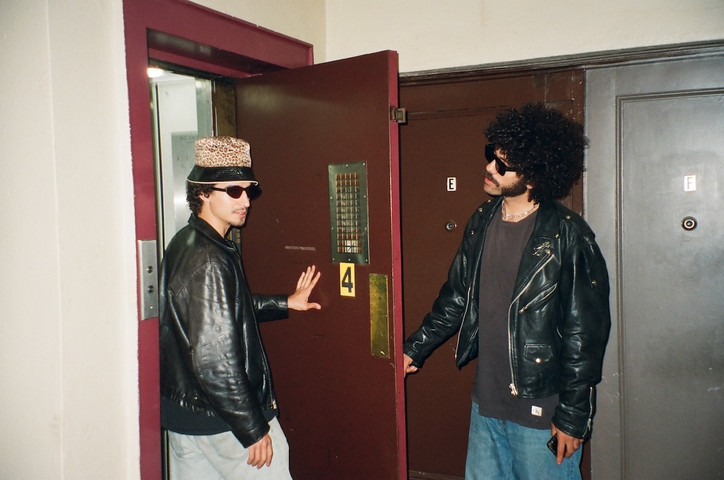
Fittingly, Cafe Dewanee is signed to Food Records, a label project founded by Isaiah Barr, Spencer Murphy, and Lucien Smith, named in honor of FOOD, the legendary artist-run SoHo cafe and restaurant of the early 1970s started by Gordon Matta-Clark. Food Records is a community-led platform that serves music from multiple generations, genres, and flavors, bringing music into nontraditional performance settings with a side of food. Like its label, Cafe Dewanee has a community approach to collaboration, connecting members of distant scenes like Berlin and NYC with curated shows and credits on its forthcoming record, which only further embody the duo’s knack for bridging sounds and community.
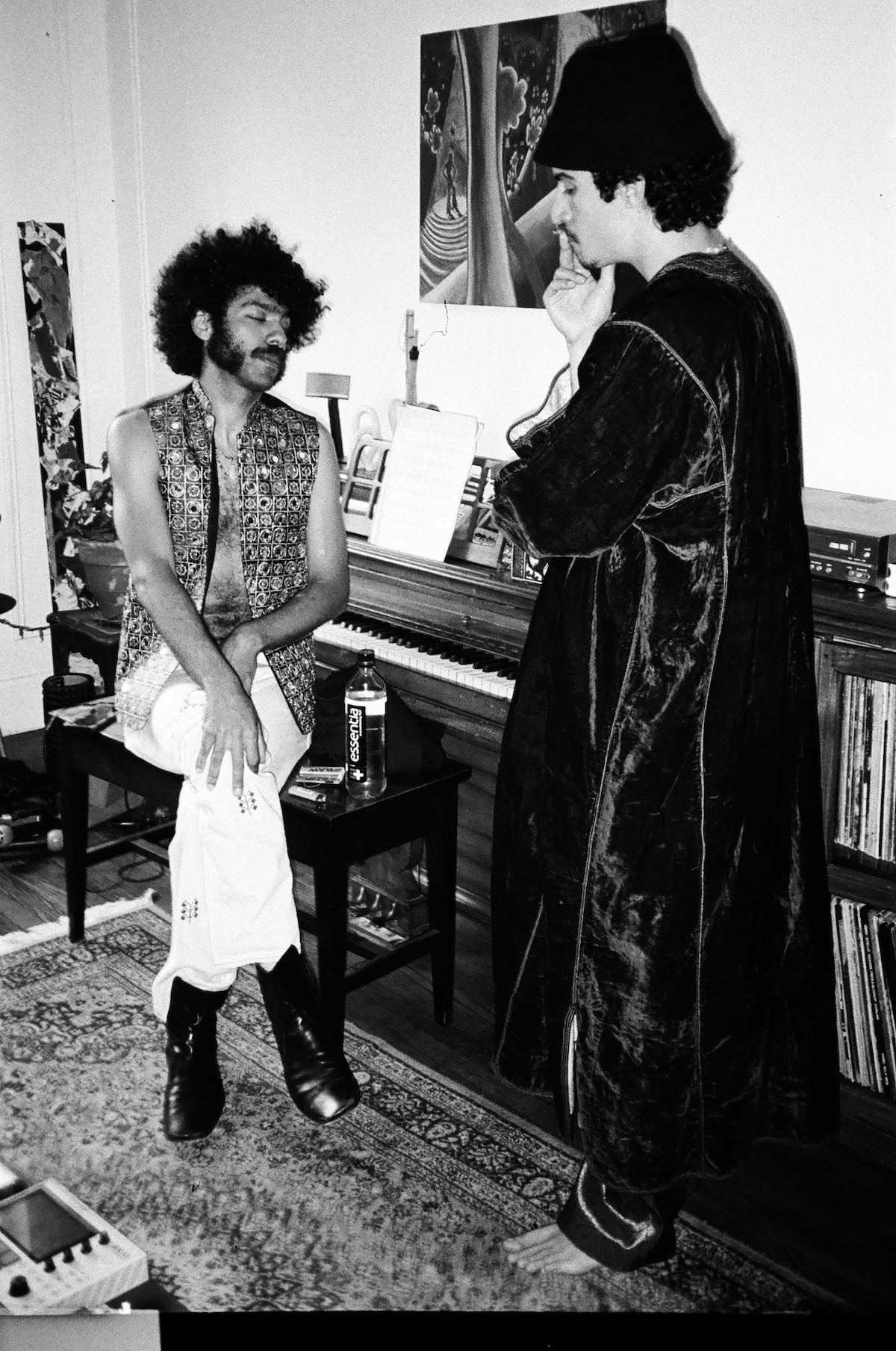
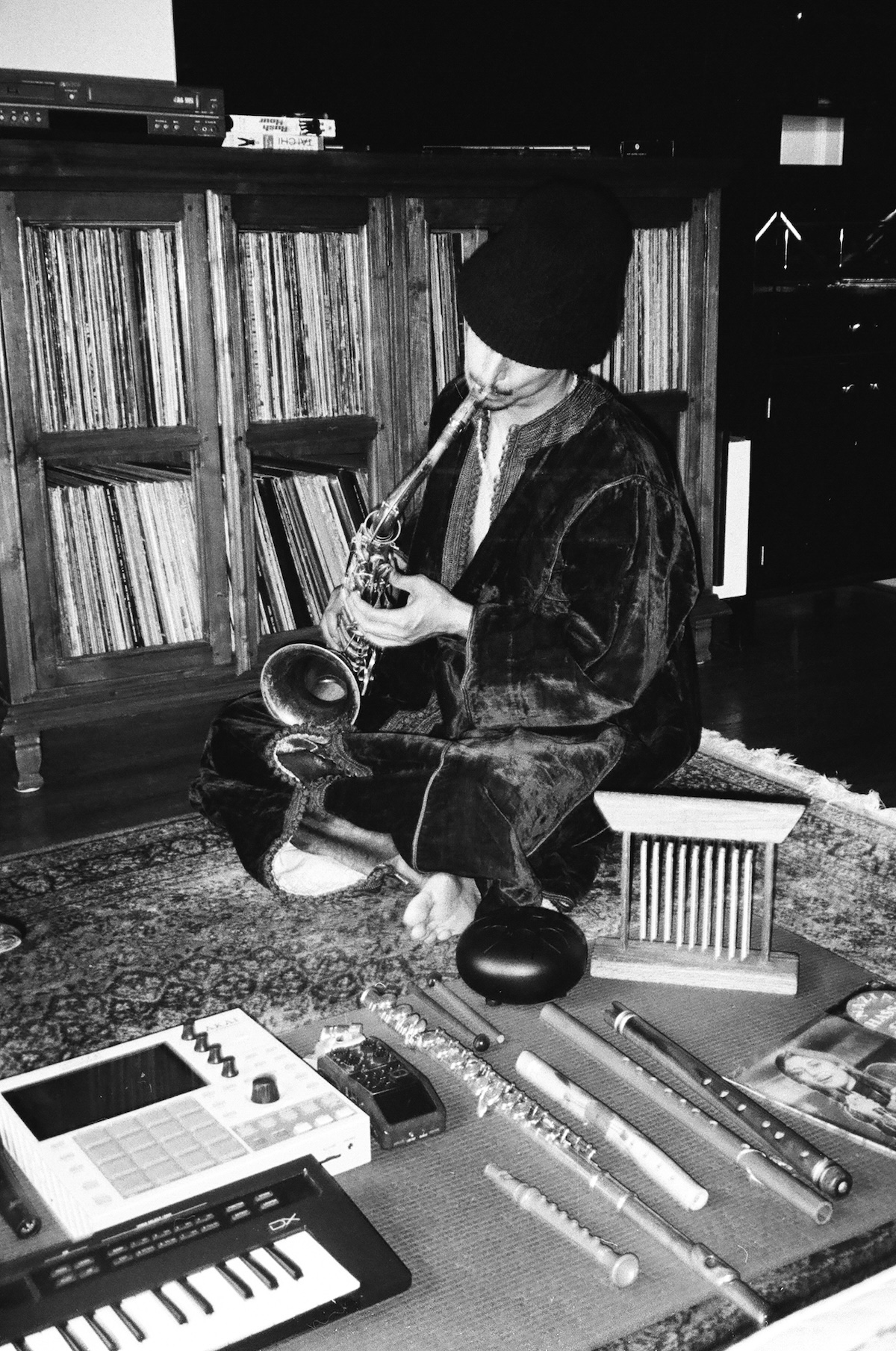
Improvising and experimenting are undeniable themes of the pair’s — to this point — rare musical output, and the forthcoming project’s lead single, “AIRPORT” attests to that. The track is accompanied by a sonic film that builds upon itself within the frame of a city landscape, encompassing stories within stories of different characters moving freely through space and time. Together, the track and visuals provide a tangible feeling of ascension and expansion — the same feeling that inspired the body of work aptly titled, THE EXPANSION.

Read Clara's conversation with office below.
Congratulations on the record dropping today. It's a big day.
Clara La San— Thank you.
As far as releasing the record, does it feel like a weight off your shoulders?
CLS— Yeah, it definitely feels like a weight off, releasing this album for people to listen to and know that I exist, that I'm on the planet, and that I haven't just disappeared, so that feels great.
Are you looking forward to touring this record as well?
CLS— Yeah, definitely. I think you always get a different perspective when you're performing the songs live, I think. So I'm just excited to see what people think of them in a live venue and just seeing their reaction and stuff.
Do you find yourself dreaming, and does that influence your art at all? I know that some accomplished artists, and also some of my friends, just don't dream at all.
CLS— It's weird because I've literally been thinking recently that I can't remember the last time I had a dream, and there has been periods of times when I'll dream or I'll maybe have nightmares and stuff. My friend was also texting me and she was like, she's had some really strange dreams. And I was like, I haven't had any dreams. I've just been going to sleep and waking up.
I have one dream where I'm being chased by a spider, like a giant spider in a strip mall.
CLS— Like an anxiety dream.
Yes, definitely slightly anxious and I remember it distinctly, but I also don't really dream that much.
CLS— I don't mind not dreaming. It's kind nice just waking up, going to sleep and waking up.
Me too.
CLS— And sometimes they can affect the way you feel in the morning. They can seep into the day, and then it's difficult to close it off and start the day.

I want to talk to you about the making of the record. Were you listening to music while you were working on it?
CLS— Well, I'm always listening to music, even if I don't realize. When I'm in the car I listen to music. Usually it's a lot of throwbacks, usually it's a lot of early 2000s R&B, from a wide range. I love Brandy a lot, and I love Amerie as well. But yeah, it's difficult to say. There wasn't one particular artist that I'd listened to a lot during the making of this record. Sometimes I'll listen to instrumental or something, no lyrics. You get kind of tired of when you are writing all the time, and sometimes you just want to disengage and you still want to listen to music, but maybe just music that you can disengage to: instrumentals, or even jazz or something.
Yeah. Going from Amerie to Amaarae, I know Yves Rothman worked on Amaarae's Fountain Baby and also worked on this record. What was working with him like and where did you guys meet?
CLS— It was amazing. We had a really great time. We connected in London, actually. We worked on some of the songs in London at the Standard Hotel, which was really fun. And then we finished the album together in LA and I spent about two weeks there, and he just really helped to bring the album to life. I know what I like and how I wanted my songs to sound, but I found it quite hard to get there, and I think I felt stuck because some of the songs were quite old and I've heard them so many times, it's hard to change them or add to them, and you kind of need a fresh pair of ears. That's how Yves really helped on this project and didn't change where it was going, but just helped me to get there to the final point where I needed to get to. I learned a lot.
So you learned a lot by being in the studio. Do you think that's also because the way that you have historically made music is insular and personal or have you always been collaborative?
CLS— I think I always love to start the demos and the songs. I like to just be on my own. I feel like I can just really disengage and just focus on what I want to write about and take my time and not have any judgements around me or anything. But I do love the idea of finishing songs in studios. Yeah, it's hard really.
It kind of gives you a different perspective on the song and you can look at it in a different way.
CLS— Exactly. I felt like there were so many times in LA when maybe I'd come up with a synth melody or something and then we'd both just be like, yeah, we'd both just have that look. That would be… it would just confirm this is the thing. How would you say it?
That “aha!” moment
CLS— Yeah, exactly.
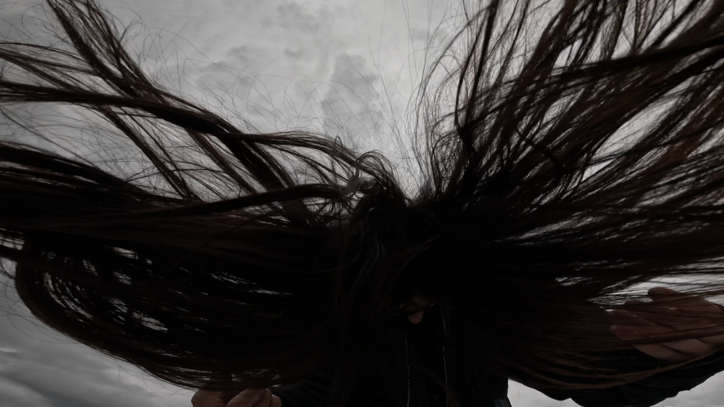
You briefly mentioned freestyling in your writing process. Have you always used freestyling as the start to the process?
CLS — Yeah, because I’m definitely not ever walking down the street and writing a song. I don't write music like that. I'll always have to start with the music, whether that's really simple or more complex, but that will kind of just give me ideas and help me to think of certain words to fit the music. And then I just hum vocal melodies or something and record them and do that quickly. I love that whole process of going back and forth and just doing the vocal melody first and then fitting lyrics to it.
Do you feel like any of that is influenced by hip-hop music at all?
CLS— I mean, I'm definitely influenced by that genre, but I'm also influenced by so much. It's hard to pinpoint one specific thing. I guess I was speaking more so in the way that a lot of rappers just kind of ad-lib over a beat or over backing track.
I did read online, and this made me quite happy, that you're a fan of Future. I'm wondering, what is your favorite Future song or album?
CLS— My favorite one is his more recent one, I Never Liked You. I liked that a lot.
Yeah, that's a good pick. I mean, you have such a range of happy, sad, hype songs. I personally really like sad Future, but I was wondering if you feel gravitated to any particular sound for his music.
CLS— Yeah, I love the kind of more upbeat ones, and when I'm listening to his music, I do listen to a lot of that. I think one of my favorite Future songs, though, is probably "Solo." And that album was amazing. Hendriix was great.
I was hesitant to ask you this, but I'm going to ask: when you look up Clara La San on the internet, the number one word that you saw show up is mysterious. It's like, this “mysterious UK artist.” Was this an intentional thing that you put out, or do you feel like you've been dubbed this? Do you feel all right being perceived as this?
CLS— It's never really been intentional. I think I've just fallen into it based off taking a mixtape offline, and people probably thought… I don't know what people thought, but I had my reasons for taking that offline. But of course I don't mind. I mean, I am a private person and I just feel content with what's out there or how I'm being perceived. It doesn't feel unnatural to me.
Do you feel like notoriety and fame and validation are important things to you? And how did you cope with being out of the limelight for a while?
CLS— I mean, I was just kind of living and stuff, working in different jobs. Maybe there would be times when I'd be like “I really want to put something out there. I want people to hear my music.” I thought, what if something were to happen to me and nobody ever heard my music? Could I feel like I had something to say? But also, I was just living my life and always writing songs. And I get so much kind of thrill from just writing a song, even if I don't share it, because it helped me to figure something out or to understand an emotional state I was in. The sharing always comes last because the main reason why I write music is for me.
You have a viral song on TikTok, "In This Darkeness". Artists run the gambit of disliking TikTok and the kind of superficiality of it. It's like, they hate it and its effect on the music industry, or they appreciate the boost that it's given to their careers. So how do you feel?
CLS— I mean, it amazes me how that happened, how that song reached so many people. It is hard to process because it did reach so many, and I personally think, yes, it's amazing. I mean, I wrote that song nine years ago, and it was just kind of living online, sitting on SoundCloud, and it was doing well on there. I'm really grateful for everyone who shared that song.
I feel like there is a sense of longing on this record. What is one of your favorite love songs or songs of longing?
CLS— This is a really great question. Caught me off guard. It's really hard to choose one I'd definitely have to say something by Sade. Definitely maybe "King of Sorrow," if not every single song. Sade is always an incredible pick.

I want to talk about the songwriting on the record because it's very, very personal and obviously you're releasing it to be listened to by lots of people. Is that something that scares you, or is it cathartic?
CLS— So a lot of the music that I write, all of it really, it does come from an honest place, and I find myself writing about real life experiences a lot, whether it's the past, present or the future. It's just been great to see how people have reacted from songs already online and how they've resonated with them. It just feels right to share music that makes people feel good and makes me feel like I figured something out.
When would you say the process of making the record began?
CLS— I mean, some of the songs on the album have come from, I'd say about six, seven years ago. Some of them are more recent, but we started working on the album I'd say two years ago. I think roughly, I'm really bad with time, so I might be slightly wrong there, but as an estimate, two years.
What has life been like for you in those two years?
CLS— I've just been able to take my time. I've just been able to enjoy writing with no restrictions. It is just so great for me to be able to write exactly what I want to write and when I want to write. I was saying this before to somebody else, but a lot of the times the music that I write isn't happy. Well, it isn't happy, but it's not necessarily sad. I don't write all the time, because I feel like I have to be in a certain mindset and I might not want to be in that mindset for the day.
Do you journal?
CLS— No, I don't. And you know what? I have tried and I just can't. I think the reason why is I don’t like the idea of writing down personal thoughts in a journal and it just being around, because I’m a really private person.
So you don't like writing your thoughts in a journal because you're private, but then you'll release it to lots of people…
CLS— In lyrics form, and I think that's different! I feel like it is a different side of you. It's the same as when people don't like their speaking voice. I wouldn't enjoy hearing me talking back, but I like hearing me singing.
How do you feel when you hear yourself sing?
CLS— I really like it. I enjoy my music, and maybe that's because I’m able to write what I want and how I want it to sound production wise. It's so therapeutic.
